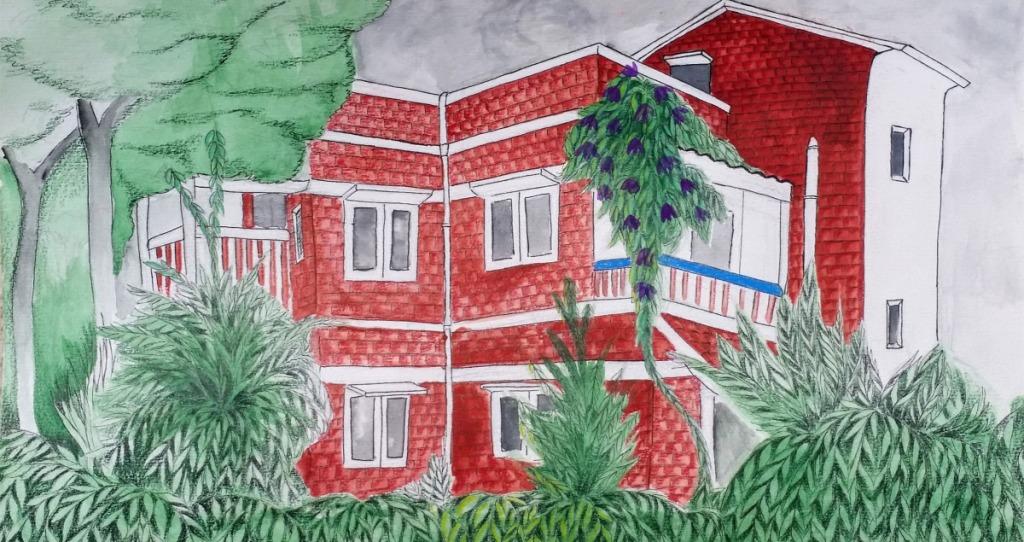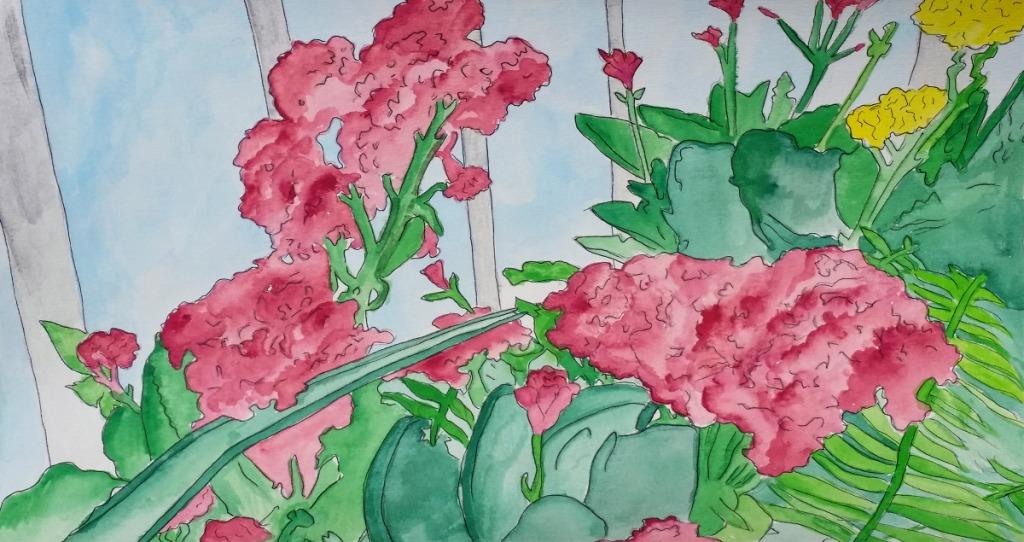Recently I noted with quiet pleasure that I finally have a gardener’s hands. Coarse and calloused, with stubborn dirt underneath my chipped, uneven fingernails. A steady reminder of my 62 companions at home clustered together in the balcony and in the three-wide window enclosures that IIT has so thoughtfully provided.
I have always liked gardening. Perhaps it is a love that crept up on me from parents who were both avid gardeners. My growing years were spent in a typical pre-liberalisation government-issue housing colony in Kolkata. But the ugly square lines of our apartment with its flat white washed walls were softened by pots of Jasmine, Hibiscus, Tulsi, Pudina medicinal herbs and for some time, with exotic orchids that Baba had brought from North Bengal. Their delicate white and yellow blooms filling our bathrooms with perfumes from faraway lands. The orchids were a source of endless humour. Ma often got caught having plaintive conversations with them, trying to cajole them into living while they were more prone to giving up and dying in the harsher climes of the plains.
When my parents retired and moved into a two-storey bungalow in the suburbs, the house was built deliberately small with lots of space outside so that Ma and Baba could carve out their own separate spaces that fit their differing gardening aesthetics.
Baba liked his flowers. He brought flowering plants and shrubs from all over India, purple Trumpet Vines, red Cardinal Creepers with their thick luscious tropical foliage, white Gardenia’s. There was a Coral Jasmine also known as the Tree of Sorrow (Shiuli or Parijat) near the eastern boundary wall that left a carpet of ethereal white flowers like shooting stars fallen to ground at dawn. We had a Chameli and Bel both from the Jasmine family, pink and white Rangoon Creepers (Madhabilata) their lush fragrances intermingling in summer and transforming our home into a redolent perfumery. There was a yellow flowering shrub that looks like Forsythia (unfortunately I do not remember its correct name) but in full bloom it made me think that surely this was a plant which only Midas could have thought up. There were so many more, some linger on, while the others have been long gone, just like my father.
Ma often got caught having plaintive conversations with them, trying to cajole them into living while they were more prone to giving up and dying in the harsher climes of the plains.
Ma was more utilitarian. She preferred fruits and vegetables, stuff that she could feed the family with. Our Mango tree at home had emerged magically one day from the compost pit – an accidental culture of three different varieties. Its fruit were so sweet that it became a legend in our neighbourhood and quickly earned its own unique name–Anjali bhog– named after its chief nurturer. The Bael (Wood Apple) tree not only fed friends and family but had a steady number of people flocking to our house for its trident-shaped leaves without which no puja in a Bengali home was complete. There were Guava, Lemon, Betel Nut and Coconut trees and vegetables for every season right up till her sudden stroke ending the annual bounty from her vegetable patch.
Didi and I were also witness to the occasional weird turf wars between Ma and Baba during winter. Ma would secretly plant cauliflower and cabbages in between Baba’s precious Delphinium, Dahlia beds. While poor Baba went quietly off the bend over this sacrilege, Ma would still argue and trying to justify her actions on the grounds that the cauliflower leaves provided excellent contrast to his blooms. Needless to say, the logic escaped Baba completely and left us in a fit of giggles.
There was a yellow flowering shrub that looks like Forsythia … but in full bloom it made me think that surely this was a plant which only Midas could have thought up.
As they tended and occasionally bickered over their garden, it gave us, the next generation of children and grandchildren, not just wonderful memories, but constant companions who somehow helped us come of age. I recently read a post by my niece on our mango tree. Both came to life at the same time and grew up together. “I would like to think that the tree and I were a reflection of each other, both of us growing into fruition, becoming the sturdy beings that we are. He is constant as I am, and is always stalwart never being anything else except it is supposed to be; a tree, a lesson that I always relearn every time I meet my childhood tree.”
You never get over the losses of your loved ones, but our garden somehow helped us absorb them. The coconut tree is now synonymous with my didima who planted it in the extreme western corner of our garden and even though she is gone, the tree still stands tall like a sentinel matriarch. The white Gardenia shrub under which we buried our beloved German shepherd puppy, Kancha. When our hired gardener cut down the Chameli tree that grew along the eaves of our house, I felt as if I lost my father again.

A garden had become synonymous with home. And so when I first moved to Bangalore as a new bride, one of my first acts of homemaking was to buy a bunch of pots and start my own. Those were early years and I had little or no knowledge. Just as I was exploring the mysteries of how best to love another human, I fumbled around at a loss for answers as to what the soil and the plants that sprang forth from it needed. Years have passed, most of my original garden is now gone except for a lone plant which has stayed with me – a silent witness to 17 years of married life.
Just as I was exploring the mysteries of how best to love another human, I fumbled around at a loss for answers as to what the soil and the plants that sprang forth from it needed.
My love for gardening has remained unchanged and has now become part of a deeper, inward journey. When I ask myself, “Why does gardening afford me so much satisfaction”? The answer grows in layers just like the steadily increasing number of my green companions. Yes the sight of green or the pleasure of digging my fingers into soft earth never fail to soothe me. Yet, that is not the entirety of the story.
Our world today is so technology driven that we often lose sight of the fact that we are little more than armchair creatures living second hand,borrowed lives. We watch more videos and read fewer books. Chat more on WhatsApp and Facebook than face-to-face. We drive more, walk less and pursuing a sport for most of us means sitting in front of the television and watching T20 cricket. We have become creatures who are all eyes and ears and have forgotten that we have arms, legs and a nose as well. With gardening I have slowly begun to reclaim all my five senses. When you potter around in digging, weeding watering, replanting,you get to know your work intimately – in your sweat, muscles and bones, in calloused hands and aching backs.
Modern urban life is also one of ceaseless noise and endless chatter where silence and solitude is a fast disappearing commodity. Saturday morning post breakfast, I am invariably with my plants. There is no need for conversation or music playing in the background and family members know that they intrude at their own peril. While my hands get to work, the world gradually slows down to match the rhythm of my beating heart. The inner chatter quietens and I can finally find that elusive stillness within. Gardening has opened up my world to the silence of growing things. It is silence of a kind that can never be written down, but once your ears learn to hear its siren song, you are snared for good.
My garden is also an outlet for my fathomless fears and insecurities– fear of a life amounting to very little, the promise of youth, a good education, inner fire all fading into indifferent middle age. Buried deep into my pots untouched by the warm summer sun lie my dreams as well as my disquietude. So when the flowers bloom, some look to the sun while there are others, those only blooms for the moon.
Midlife also walks you slowly into wisdom. I tell myself, “You are just a small human with more longing than you can fit within yourself”. I turn to my plants to relearn lessons that only nature can provide. Of birth and death, renewal and regeneration. Of patience (my Desert Rose has ignored my cajoling and still refuses to bloom) and perseverance (you only need to look to weeds and grass for that lesson).
My garden is also an outlet for my fathomless fears and insecurities– fear of a life amounting to very little, the promise of youth, a good education, inner fire all fading into indifferent middle age.
Acceptance is my small quiet garden where I celebrate the quiet miracles of life that seek no attention. A blooming flower, the fresh leaves of summer, the sound of the breeze as it rattles the bamboo chime, the quiet companionship of sitting in the balcony with your partner at the end of a long day when nothing and everything is said in silence.
You count your blessings. And you count again. And again. And again.
You wonder about life, death, life and realise, just like ourselves our gardens too are mostly a memory. You wonder – when the time comes shall I too leave a legacy of nurturing for my son?
Plants and children.
You love and care for them with all of you and in the end, nature will improvise and children will do what they need to do. And so I return to my garden and plant another wish and have yet another silent conversation. This time with my son,
Come, let me gift you a garden, my little darling
And talk about this witchery called life and living
All I can tell you is what I have learnt
This world is more than just a thrill for the eyes
Or food for the senses
It’s more than blood and bones
or Knowledge gained from books
and loves lost
It is praising and giving.
Giving until giving feels like receiving.
And just as the wolf had taught the little prince
You too must remember always,
“You become responsible, forever, for what you have tamed”

2 comments
Glad to see another amazing facet of you. Nurture it always.
Wonderful philosophical article! Congratulations, Damayanti!